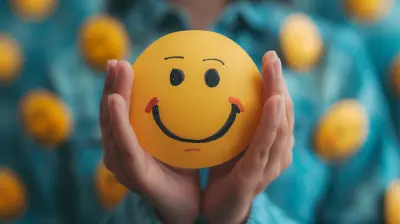How Depression Affects Your Cognitive Functions
30 October 2025
Let’s face it — when you're dealing with depression, everything feels harder. It’s not just about feeling down or detached. It’s a full-body experience that messes with your motivation, your sleep, your appetite, and yes — your brainpower.
Ever walked into a room and immediately forgotten why you’re there? Or stared at your screen for minutes, unsure of what you were even doing before you got lost in your thoughts? That foggy, heavy-brain feeling isn’t random — it could be depression messing with your cognitive functions.
Let’s dive into this topic and get real about how depression affects your thinking, memory, focus, and overall mental performance. But don’t worry, this isn’t just a heavy read. By the end, we’ll talk about ways to start reclaiming your mental clarity too.
What Are Cognitive Functions Anyway?
Before we unravel how depression dampens them, let’s talk about what cognitive functions actually are.Think of your brain as a supercomputer. Cognitive functions are the programs it runs — like memory, attention, language, problem-solving, and decision-making. They help you get through your day, make sense of the world, plan for the future, and stay focused in the now.
When everything’s working smoothly, you might not even notice these systems. But when they’re off? It’s like trying to stream a movie with a slow internet connection — glitchy, frustrating, and exhausting.
Depression Is More Than Just Sadness
Here’s something that needs to be said loud and clear: depression isn’t just feeling sad. It’s a complex mental health condition that impacts nearly every part of your life — including your brain's ability to function at full capacity.Many people think depression is purely emotional. But in reality, it can impact your behavior, your physical health, and yes — your cognition.
The Brain On Depression: What’s Going On Up There?
Let’s get into the science — just a little, I promise. Depression affects several key areas of the brain that are responsible for cognitive functions:- Prefrontal Cortex: This is your decision-making center. It helps you plan, set goals, and regulate emotions.
- Hippocampus: This guy is the memory master. It helps you form and recall memories.
- Amygdala: This part is all about emotions — especially fear and stress.
When depression kicks in, these areas can shrink in size, lose nerve connections, or become less active. Think of it like a power outage in parts of your house — you can still kinda function, but everything is dimmer and slower.
Memory Loss and Forgetfulness
Ever felt like your brain is just... offline?Memory issues are one of the most common cognitive challenges linked to depression. You might struggle to:
- Remember appointments
- Recall conversations
- Retain information you just read
And it’s not because you’re lazy or not paying attention — it’s because your brain is literally under extra stress. Depression affects the hippocampus, which plays a major role in forming and retrieving memories. When that part isn’t firing properly, remembering even the simplest things can feel like you’re trying to find your keys blindfolded.
Trouble Concentrating? You’re Not Alone
Focus is another major victim when depression walks in.Have you ever sat down to work or study and after 30 minutes realized you haven’t done anything except scroll through your phone or stare at a wall? That’s cognitive fog — and it’s a real symptom of depression.
This lack of concentration isn’t about being careless. It’s a biological outcome of the way depression affects neurochemical balance in the brain. Dopamine and serotonin — two big players responsible for feeling motivated and alert — are often out of whack in people with depression.
The result? Staying focused feels like trying to tune in to a radio station through static.
Slower Thinking and Decision-Making
Ever taken forever to make a simple decision — like what to eat for lunch? Or felt like your brain is moving at the speed of molasses?That’s another cognitive effect of depression. You might find yourself hesitating more, feeling overwhelmed by choices, or second-guessing every decision. This is because depression slows down your executive functioning — the mental skills that help you plan, organize, and execute tasks.
It’s not about intelligence. It’s about mental energy — and with depression, that energy tank is often running close to empty.
Why You Feel Mentally Exhausted All the Time
Mental fatigue in depression is real. It’s not “just in your head” (well, okay — technically it is, but you know what I mean).Think of it like driving a car with the emergency brake on. You’re still moving, but it takes way more effort. Even basic tasks like replying to messages or washing dishes can feel like uphill battles.
This constant mental exhaustion makes it harder to concentrate, remember, and solve problems — feeding into a frustrating cycle that keeps you stuck.
Emotional Strain Makes Cognitive Function Worse
Here’s the kicker: depression and cognitive dysfunction feed each other. The more frustrated you feel about your brain fog, the worse the depression can get. And the worse your depression gets, the more your brain feels like it’s stuck in cement.It’s like being in a room where all the lights are dimmed. You can still see, but everything takes more effort. The emotional turmoil drains your cognitive resources, and the cognitive challenges increase your emotional distress. See the cycle?
Positive News: Cognitive Functions Can Bounce Back
Now, let’s shift gears to something encouraging — because you’re not doomed to live in this fog forever.With the right support and treatment, many people experience full or partial recovery of their cognitive abilities. Why? Because the brain is incredibly adaptable. It’s called neuroplasticity — your brain’s ability to rewire itself.
Here’s what can help:
1. Therapy (Especially CBT)
Cognitive Behavioral Therapy (CBT) is a game-changer. It doesn’t just help manage emotions — it also boosts cognitive skills like attention, decision-making, and memory.CBT helps you challenge negative thought patterns and develop healthier mental habits. Think of it as a gym workout for your brain.
2. Medication (On a Case-by-Case Basis)
Antidepressants aren’t magic pills, but they can level the playing field — especially when neurotransmitters are out of balance. When medication reduces depressive symptoms, cognitive functions often improve too.Talk to your doctor or mental health provider to see if it’s right for you.
3. Daily Brain-Boosting Habits
Let’s not underestimate the power of everyday habits. Here are a few tips to support your brain health:- Sleep: Your brain cleans itself every night — literally. Get 7–9 hours.
- Nutrition: Omega-3s, leafy greens, and berries? Yes please.
- Movement: Even a short walk can increase oxygen and blood flow to the brain.
- Mindfulness: Meditation improves attention span and reduces anxiety.
- Hydration: Your brain is over 70% water. Keep it fueled!
You’re Not Broken — You’re Healing
If anything in this article sounds familiar, know this: your struggles are valid, and you’re not alone. Depression may mess with your head, but it doesn’t define your intelligence, your worth, or your potential.Think of your brain like a garden going through a tough winter. The flowers may not be blooming right now, but the roots are still there, waiting for the right conditions to grow again.
Support, patience, and self-care can bring light back into the garden.
Little Steps, Big Impact
You don’t need to completely overhaul your life to see improvements. Start small.Maybe it’s taking a 5-minute walk today.
Maybe it’s journaling your thoughts.
Maybe it’s finally making that therapy appointment or opening up to someone you trust.
Whatever it is — start. One step at a time. Even if you feel stuck right now, your mind is more resilient than you think.
Final Thoughts: You’re Capable of Clarity
Cognitive challenges during depression are real. But they’re not permanent. With compassion, support, and consistent care, your mind can shine bright again.So don’t give up on yourself. The fog won’t last forever. And even on the cloudiest days, the sun is still up there — waiting for you.
all images in this post were generated using AI tools
Category:
DepressionAuthor:

Jenna Richardson
Discussion
rate this article
1 comments
Rune McMahan
Great article! It’s eye-opening how depression can cloud our thinking. Understanding it better can really help us in our daily lives.
November 3, 2025 at 5:44 PM

Jenna Richardson
Thank you! I'm glad you found it insightful. Understanding depression is key to managing its effects on our thinking.


